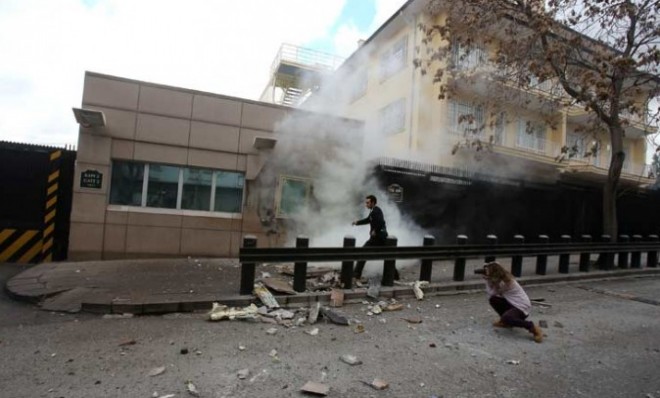Suicide bomber attacks the U.S. embassy in Turkey
Two are reported dead as suspicion falls on Kurdish separatists


A free daily email with the biggest news stories of the day – and the best features from TheWeek.com
You are now subscribed
Your newsletter sign-up was successful
On Friday, a suicide bomber struck the U.S. embassy in Ankara, Turkey, killing himself and a Turkish guard, according to provincial governor Alaattin Yuksel. The bomber reportedly detonated his charge as he entered the embassy's security checkpoint, limiting the blast to the facility's outer ring.
Suspicion immediately fell on the Kurdistan Workers Party, or PKK, a separatist group in Turkey that the U.S. has designated a terrorist organization. However, Turkey is no stranger to terrorist attacks, and it's more than possible that another group was responsible. In 2003, a truck bomber allegedly affiliated with al Qaeda killed 58 people in an attack on the British consulate in Istanbul. In 2008, another al-Qaeda-linked attack killed three policemen outside the U.S. consulate in Istanbul.
Furthermore, Turish Prime Minister Recep Erdogan has been a fierce critic of Syrian President Bashar al-Assad, who is in the midst of a brutal civil war.
The Week
Escape your echo chamber. Get the facts behind the news, plus analysis from multiple perspectives.

Sign up for The Week's Free Newsletters
From our morning news briefing to a weekly Good News Newsletter, get the best of The Week delivered directly to your inbox.
From our morning news briefing to a weekly Good News Newsletter, get the best of The Week delivered directly to your inbox.
The PKK's co-founder, Sakine Cansiz, was recently shot and killed in Paris, in what many believe to be a political assassination designed to disrupt fledgling negotiations between Erdogan's government and another PKK official, Abdullah Ocalan. The attack on the U.S. embassy, by implicating the PKK, could feasibly be a similar attempt at disrupting those talks.
A free daily email with the biggest news stories of the day – and the best features from TheWeek.com
Ryu Spaeth is deputy editor at TheWeek.com. Follow him on Twitter.
-
 Sepsis ‘breakthrough’: the world’s first targeted treatment?
Sepsis ‘breakthrough’: the world’s first targeted treatment?The Explainer New drug could reverse effects of sepsis, rather than trying to treat infection with antibiotics
-
 James Van Der Beek obituary: fresh-faced Dawson’s Creek star
James Van Der Beek obituary: fresh-faced Dawson’s Creek starIn The Spotlight Van Der Beek fronted one of the most successful teen dramas of the 90s – but his Dawson fame proved a double-edged sword
-
 Is Andrew’s arrest the end for the monarchy?
Is Andrew’s arrest the end for the monarchy?Today's Big Question The King has distanced the royal family from his disgraced brother but critics claim a ‘fit of revolutionary disgust’ could still wipe them out